
|
Astronomy Picture Of the Day (APOD)
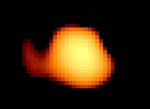 Resolving Mira
Resolving Mira
13.08.1997
Most stars appear only as points of light. Recently, Betelgeuse became the second star, after our Sun, to have it surface resolved. Now add Mira to the list. Mira A is a red giant star undergoing dramatic pulsations, causing it to become more than 100 times brighter over the course of a year.
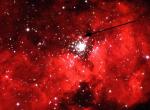 Sher 25: A Pending Supernova?
Sher 25: A Pending Supernova?
12.08.1997
No supernova has ever been predicted - yet. These dramatic stellar explosions that destroy stars, that create and disperse the elements that compose people and planets, that light up the night sky, are not so well understood that astronomers can accurately predict when a star will explode - yet. Perhaps Sher 25 will be the first.
 A Perseid Meteor
A Perseid Meteor
11.08.1997
Tonight the Perseid Meteor Shower reaches its maximum. Grains of rocky ice will streak across the sky as they evaporate during entry into Earth's atmosphere. These ice chips were shed from Comet Swift-Tuttle. The Perseids result from the annual crossing of the Earth through Comet Swift-Tuttle's orbit.
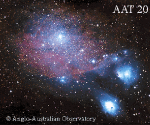 Nebulosity in Sagittarius
Nebulosity in Sagittarius
10.08.1997
What causes the colors in this beautiful nebulosity in Sagittarius? Dubbed NGC 6589 and NGC 6590, the colors of this nebulosity, are caused by gas and dust. The blue color of the nebula nearest the bright stars is caused by reflection off interstellar dust.
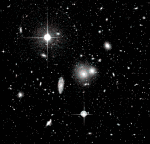 The Hydra Cluster of Galaxies
The Hydra Cluster of Galaxies
9.08.1997
You are flying through space and come to ... the Hydra Cluster of Galaxies. Listed as Abell 1060, the Hydra Cluster contains well over 100 bright galaxies. Clusters of galaxies are the largest gravitationally-bound objects in the universe.
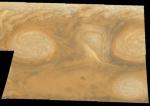 White Oval Clouds on Jupiter
White Oval Clouds on Jupiter
8.08.1997
What are those white ovals all over Jupiter? Storms! Jupiter's clouds can swirl rapidly in raised high-pressure storm systems that circle the planet. The above pictured white ovals are located near the Great Red Spot, and have persisted on Jupiter since the 1930s. The Great Red Spot has persisted for at least 300 years.
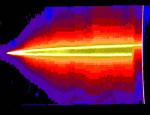 Jupiter's Ring Halo
Jupiter's Ring Halo
7.08.1997
Why do small particles hover around Jupiter's rings? These particles form a previously unknown ring halo, recently discovered by the robot spacecraft Galileo currently orbiting Jupiter. Galileo obtained this image when on the far side of Jupiter - from this orientation scattered sunlight makes the halo ring visible.
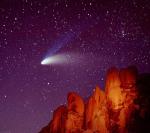 Hale-Bopp from Indian Cove
Hale-Bopp from Indian Cove
6.08.1997
Good cameras were able to obtain impressive photographs of Comet Hale-Bopp when at its brightest earlier this year. In the above photograph taken April 5th, Comet Hale-Bopp was imaged from the Indian Cove Campground in the Joshua Tree National Forest in California, USA.
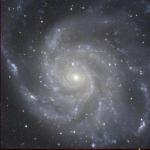 M101: The Pinwheel Galaxy
M101: The Pinwheel Galaxy
5.08.1997
Why do many galaxies appear as spirals? A striking example is M101, shown above, whose relatively close distance of about 22 million light years allow it to be studied in some detail. Recent evidence...
4.08.1997
On Mars, sunsets can appear salmon pink. The unusual color is partly due to rust: oxidized iron from Martian dust circulating in the Martian atmosphere. Clouds appear in the morning and evening, but usually evaporate in the midday Sun.
|
January February March April May June July August September October November December |
|||||||||||||||||||||||||||||||||||||||||||||||||